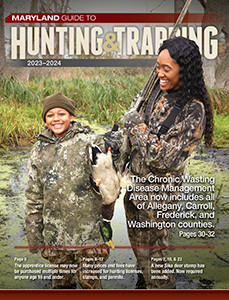Department of Natural Resources
Wes Moore, Governor
Aruna Miller, Lieutenant Governor
Josh Kurtz, Secretary of the Department of Natural Resources
Paul A. Peditto, Director of the Wildlife and Heritage Service
Maryland Wildlife Advisory Commissio
The Wildlife Advisory Commission was created by legislation to advise the secretary of the Department of Natural Resources on wildlife matters.
All members are appointed by the governor. Contact the Wildlife Advisory Commission by writing to:
Maryland Wildlife Advisory Commission Maryland Department of Natural Resources Wildlife and Heritage Service Tawes State Office Building, E-1
580 Taylor Ave. Annapolis, MD 21401
or email
Commissioners
Benjamin H. Alder
D. Matthew Cole
Thurmond “TJ” L. Jenkins
Steven W. Keithley
J. Jeremy Parks
Kaitlin L. Rossignuolo
Joe L. Schroyer
Ryan D. Showalter esq.
Carl F. Wagner
Maryland Department of Natural Resources
Wildlife and Heritage Service
Tawes State Office Building, E-1
580 Taylor Avenue
Annapolis, MD 21401
Toll free in Maryland: 877-620-8367
TTY users call via the MD Relay
Federal Aid in Wildlife Restoration
Publication # DNR 03-050923-355
Cover photograph provided through the Northeast Association of Fish and Wildlife Agencies.
The Guide to Hunting and Trapping in Maryland is a publication of the Department of Natural Resources, Wildlife and Heritage Service. Political advocacy ads, ads promoting alcohol, tobacco or recreational drugs and ads of a sexual nature will not be accepted. The Maryland Department of Natural Resources, Wildlife and Heritage Service is not responsible for any advertising claims contained herein. The department disclaims any liability regarding product pricing, claims, descriptions, availability or condition. No warranty is expressed or implied concerning product errors, omissions or misprints.
This publication is intended as a guide only. For state laws and regulations, see the Natural Resources Article of the Annotated Code of Maryland and the Code of Maryland Regulations, Title 08 at the following web sites:
- Laws:
lawlib.state.md.us - Regulations:
dsd.maryland.gov/Pages/COMARHome.aspx
The facilities of the Department of Natural Resources are available to all without regard to race, color, religion, sex, sexual orientation, age, national origin or physical or mental disability. Accommodations for individuals with disabilities will be provided upon request. Seven days advance notice is requested. This document is available in alternative format upon request from a qualified individual with a disability.
This program receives Federal financial assistance from the U.S. Fish and Wildlife Service. Under Title VI of the 1964 Civil Rights Act, Section 504 of the Rehabilitation Act of 1973, Title II of the Americans with Disabilities Act of 1990, the Age Discrimination Act of 1975, and Title IX of the Education Amendments of 1972, the U.S. Department of the Interior prohibits discrimination on the basis of race, color, national origin, age, sex, or disability.
If you believe that you have been discriminated against in any program, activity, or facility, or if you need more information, please write to:
Office of Fair Practices
Department of Natural Resources
580 Taylor Ave., C-3
Annapolis MD 21401
Telephone: (410)260-8058
Email: [email protected]
The Civil Rights Coordinator for Public Access
U.S. Fish and Wildlife Service
4401 N. Fairfax Drive, Mail Stop: WSFR-4020
Arlington, Virginia 22203
Attention Successful Deer Hunters!
- You can be eligible to take a tax credit for the qualified expenses of donating processed deer meat to a nonprofit venison donation program.
- An individual can claim a credit of up to $50 for the butchering and processing expenses for an antlerless deer.
- To qualify, a hunter must comply with applicable state hunting laws and regulations. The actual tax credit will be part of your annual Maryland tax filing.
Potomac River Boating Regulations
A person aboard a vessel, raft or tube shall wear a U.S. Coast Guard Approved Type I, II, III or V personal flotation device at all times while underway on the Upper Potomac River (that portion of the Potomac River and its tributaries above the Maryland/District of Columbia boundary near Little Falls) and its tributaries, during the period beginning at 12:01 a.m. each November 15, and ending at 12 midnight each succeeding May 15. At all other times a vessel, raft or tube shall be equipped with a U.S. Coast Guard approved Type I, II, III or V personal flotation device for each person aboard while underway on the Upper Potomac River and its tributaries.
An individual using a vessel, raft or tube upon any white water portion of any designated stream segment shall wear a U.S. Coast Guard approved Type III or V personal flotation device at all times; see COMAR 08.18.01.08 for a complete listing. Furthermore, an individual using a kayak or covered canoe vessel on a white water portion of a designated stream segment shall wear a safety helmet.
Additionally, no person may use a recreational vessel 16 feet or more in length unless one Type IV throwable personal flotation device is onboard in addition to the total number of wearable personal flotation devices required.
Natural Resources Police Career Opportunities
If you have what it takes and the desire to serve, we’re interested in talking to you.
To begin your career as a Maryland Natural Resources Police officer, please contact us at [email protected], or visit the Maryland Natural Resources Police Careers page at https://dnr.maryland.gov/nrp/pages/careers.aspx

